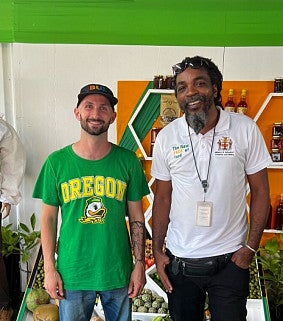The food studies specialization offers a coherent structure that allows students to develop a richer intellectual foundation than would be possible or practical outside the program. The specialization is designed to enrich the qualifications of master's and doctoral students, whether they have academic or community-based work aspirations.
Apply to Specialize in Food Studies
To apply to pursue a graduate specialization in food studies, please fill out the Graduate School’s Declaration of Graduate Specialization form.
This form should be signed and processed by Nathan Adams, Graduate Coordinator in Environmental Studies (ENVS), with the approval of Food Studies Director Hannah Cutting-Jones. Once completed and signed, the form must be returned to the Graduate School.
Please see the UO Graduate School website for FAQ about enrollment and requirements for pursuing a specialization.

How Food Studies Prepares Your Career
“Thanks to the support from the Food Studies Award, I had the opportunity to complete graduate fieldwork in Jamaica for my thesis, where I conducted extensive interviews with smallholder farmers and key stakeholders involved in agricultural development in the country. This experience has been nothing short of transformative. I hope my thesis will contribute significantly to our understanding of the challenges smallholder farmers face in Jamaica and offer potential solutions and policy recommendations.”
—Joel Matheson, global studies graduate student, food studies specialization, ’24
Specialization Requirements
This 18-credit interdisciplinary graduate specialization track is open to all University of Oregon graduate students. By combining the food studies specialization with their primary degree, students can enhance their education and future marketability.
Core Course (4 credits)
All students in the specialization will complete ENVS 607 Food Matters: Interdisciplinary Perspectives in Food Studies. This course will form the foundation for the graduate specialization and will introduce participating students to the wide-ranging and inherently interdisciplinary “field” of food studies.
As academic interest in the realm of food studies has developed, it has become clear that there are key approaches and insights in disciplines across the social sciences, the humanities, and the sciences. Each broad academic realm has its focal concerns and approaches.
By design, this course will provide an introduction to food studies scholarship across this intellectual continuum. Upon completion, students in the specialization will have a working knowledge of and a foundational fluency with the food studies scholarship writ large and will be able to see how their own focus fits within the larger field.
Breadth Requirement (8 credits)
Students will complete two 4-credit food-related courses outside their focal academic division. For example, students in a degree program in the Social Sciences will take at least one Humanities and one Natural Sciences course.
By taking these courses, students in the specialization will engage different theoretical, epistemological, and methodological traditions that are relevant in the broad field of food studies. In essence, this requirement will ensure that participants in the specialization go beyond the requirements of their major fields to gain the kind of complementary perspectives that are at the center of a truly interdisciplinary program.
Courses will be selected with guidance from and the approval of the specialization coordinator.
Praxis/Internship Experience (4 credits)
Recognizing that food issues offer a particularly important link between the academic world and broader communities, students in the specialization will complete a hands-on experience with a group or project involved directly in food-related research, practice, and/or advocacy. The goal is to foster awareness of and to ensure exposure to the important connections between academic analysis and practical application. This experience will be valuable to students pursuing academic careers and to those intending to follow a more applied trajectory.
These experiences will be selected with guidance from and the approval of the specialization coordinator.
Colloquium Participation (2 credits)
Students must enroll in at least two terms of the 1-credit “Food Talks” research colloquium during their matriculation. As part of this forum, students will attend three food-related talks or events during the term, gaining a broader knowledge of current research topics, designs, and methodologies in the field of food studies.
Completing the Specialization
Current specialization students are responsible for keeping track of their progress using the Completion Checklist.
Students should also check in with the Graduate Programs Coordinator, Nathan Adams, when program requirements have been approved for enrollment and again when they have been completed.

